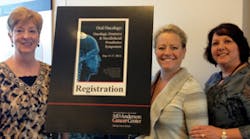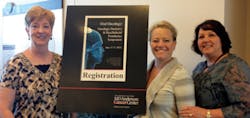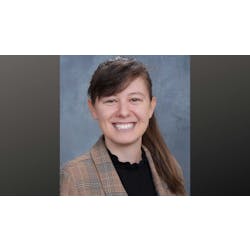By Christine Nathe, RDH, MS
This month I will spotlight a dental hygienist who works in a particularly interesting setting – a cancer center. Jennifer Brown practices in Colorado and has received two clinical excellence awards, one from the Colorado Dental Hygienists' Association. Her career exemplifies an important role that dental hygienists should be playing in our national health care systems. Additionally, this career is a great example of how important it is for dental hygienists to work with an interdisciplinary team.
Why did you decide to go into dental hygiene?
I was fortunate to grow up in a dental office. My mom was a dental assistant and also worked at the front desk. As a child, I remember doing all of my science fair projects on tooth decay and root canal therapy. When it was time to go to college I was advised by many to pursue a degree in business and/or finance, and at first I went in that direction. However, it was not long before I realized I was pursuing the wrong profession, and when the opportunity arose to work in a dental office, I jumped on it! I worked my way up from "office gopher" to assisting, and I quickly realized dental hygiene was where I needed to be.
What is your current position?
I currently work at the Dorcy Cancer Center in Pueblo, Colorado. I serve as a hygienist on the CARES Team (Cancer Assessment Resources/Research Education and Survivorship). We are a team of health-care professionals (dental hygienist, speech pathologist, nutritionist, and physical therapist) who assist head-and-neck cancer patients through their radiation treatment. Our goal is to meet each individual's unique and complex needs.
--------------------------------------------------------------
Other articles by Nathe:
--------------------------------------------------------------
First, we assess each patient before they begin treatment, and we continue to meet with them weekly to address complications that arise from treatment. We also follow up with them for one year post radiation treatment. I'm personally responsible for all correspondence with the patient's dentist and oral surgeon, coordinating their dental needs before radiation treatment begins. Also, if needed, I fabricate fluoride trays, mouthguards, and stents to meet their individual treatment needs. I spend a lot of time researching evidence-based theories in order to implement the best dental care for each patient. I also try to reach out to other dental professionals. I have another dental hygienist teammate, Cindy Purdy, who reaches out to the dental community. She travels frequently to attend dental conventions, and she advises me of new products. I also practice three days a week in a private practice setting. I'm currently developing a cancer patient care protocol for private practices to meet the needs of patients who are receiving chemotherapy and/or radiation therapy.
How did you get into dental public health?
One of my long-term patients presented in my chair with a letter from an "oncology dental hygienist" that informed us of his recent radiation treatment for head-and-neck cancer, and his special dental needs and concerns for lifelong treatment. I contacted the hospital about the duties of an oncology hygienist, and after being put in touch with her, I learned more about the position and informed her of my interest in her work.
Debra Flesher-Bratt, RDH, who started the hygiene position at Dorcy Cancer Center, has held the position for several years at two hospitals in Colorado. When she resigned from her position at Dorcy, she told the staff about my desire to have the position, and almost one year later, here I am. It's been an intense learning curve, but I love this position and my interest in this work grows with each patient. I recently attended an Oral Oncology Symposium at MD Anderson Cancer Center, and I look forward to continuing my education through work experience and other symposiums across the country.
Can you discuss any particularly interesting experiences you've had in your dental public health positions?
Every week and every new diagnosis brings a new learning experience and a chance to think outside the box to meet the needs of patients. I meet with each patient once a week, and in between visits the gears are continuously turning in my head as to how to personalize their treatment. As with all dental hygiene, each patient responds to instruction and treatment differently. At times, my biggest challenge is encouraging their compliance, knowing that what we're recommending will serve them in the later weeks of treatment. Until they experience the intense and severe complications radiation treatment brings, it's a struggle to explain the need for preventive care.
Depending on the patient's diagnosis and proposed treatment, they all present in the dental chair with a different story and oral care needs. Many of my patients have ignored their dental health for years and must deal with their dental needs immediately, and many need full-mouth extractions. We strive to preserve their dental function, but we often have to make difficult decisions to avoid severe dental complications in the future. Head-and-neck radiation treatment has acute and chronic side effects, and I am responsible for educating my patients, seeing them through treatment, and showing them how to maintain their oral health for life.
What type of advice would you give to practicing hygienists who are thinking of doing something different?
This position has changed my career. It has fueled a newfound passion in me for my patients, both at the cancer center and in private practice. I'm excited to help people in a new and challenging way. There is a profound need in the health-care world for the influence of dental hygiene. Perhaps crossing into the hospital setting will help us break down the barriers and misconceptions and show that oral health greatly serves in overall health. The health-care setting is very different from the typical dental office, and it has been a challenge to integrate dental services into a hospital setting. It's a balancing act to provide the best patient care and meet corporate and government standards.
Do you have anything else you'd like to share?
Please be aware of the rising epidemic of HPV-positive oropharyngeal cancers. The face of oral cancer is changing and cannot be ignored. Insist that proper oral cancer screenings and oral cancer awareness have a big presence in your office. I have witnessed the early signs and symptoms ignored by both patient and physician. Be prepared to meet the unique and complex needs of oral cancer patients, as we are their first line of defense and the best suited to treat and minimize their complications. Many of these cancer patients will not be well informed regarding their dental needs, because there aren't many programs like the CARES Team at Dorcy Cancer Center.
Jennifer’s career highlights the importance of dental hygiene in comprehensive health care. Dental hygienists such as Jennifer, Cindy, and Debra are pioneers who have integrated dental hygiene into a comprehensive health-care system, and programs like this need to be replicated throughout the country. As a profession, it's refreshing to know that dental hygiene continues to advance, thus helping those in need of our services!
CHRISTINE NATHE, RDH, MS, is director at the University of New Mexico, Division of Dental Hygiene, in Albuquerque, N.M. She is also the author of "Dental Public Health Research" (www.pearsonhighered.com/educator), which is in its third edition with Pearson. She can be reached at [email protected] or (505) 272-8147.
Past RDH Issues







